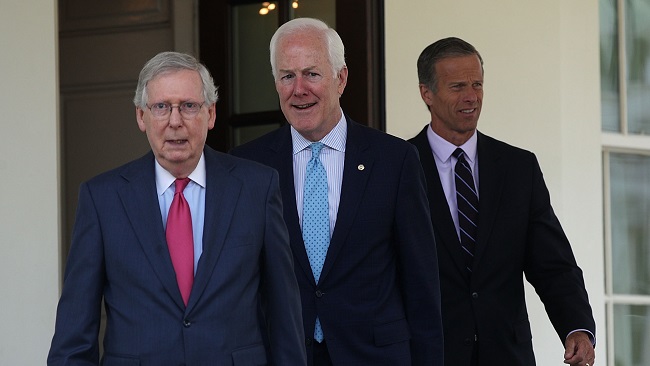
If Donald Trump and congressional Republicans ultimately decide not to “own” the supposed failure of the Affordable Care Act, then a lot of angry, uninsured Americans are going to let them hear about it. Or at least that’s the implication of the Congressional Budget Office’s (CBO) new score for Senate Republicans’ current plan to repeal Obamacare now and reconvene within the next two years to present a solution. For despite Senate Majority Leader Mitch McConnell’s (R-Kentucky) plan to salvage what’s left of the Obamacare Repeal Reconciliation Act of 2017, the prospect of dropping certain aspects outright doesn’t bode well.
According to CNBC, 32 million more Americans than current numbers would become uninsured by 2026 if the Senate’s plan to repeal certain provisions of Obamacare and replace them later were to go forward. The score is drastically worse than what the CBO previously determined for the American Health Care Act, the House’s version of the bill, which concluded 22 million more people would lose their health insurance by the same year. Of course, Trumpcare — for all its faults — was at least trying to offer something in Obamacare’s stead. The Senate’s current plan, however, does not.
Hence why, as MSNBC notes, 17 million people alone would lose their current health insurance coverage by 2018. That’s 17 million more people than current 2017 tallies of uninsured Americans under Obamacare, major provisions and all. By 2020, 27 million people would become uninsured.
CBO on the straight Obamacare repeal:
—17 million more uninsured by 2018
—27 million by 2020
—32 million by 2026https://t.co/hgOJpEHE5z— Kyle Griffin (@kylegriffin1) July 19, 2017
Aside from the loss of certain provisions, however, the CBO concluded the Senate’s repeal-only plan would also send health insurance premiums skyrocketing — thereby preventing those seeking coverage from doing so:
Average premiums in the nongroup market (for individual policies purchased through the marketplaces or directly from insurers) would increase by roughly 25 percent—relative to projections under current law—in 2018. The increase would reach about 50 percent in 2020, and premiums would about double by 2026.
As for cutting costs, the CBO also reported that cutting the controversial Obamacare provisions would decrease the federal deficit significantly by $473 billion by 2026. Unsurprisingly, the measure’s monetary gains weren’t enough to impress fierce critics of Senate Republicans’ attempt to repeal Obamacare, as indicated by Minority Leader Chuck Schumer (D-New York) in a statement:
Schumer: The CBO score of the Senate 'repeal and run' bill confirms: "it was a horrible idea in January and it’s a horrible idea now." pic.twitter.com/gisiW41XSk
— Kyle Griffin (@kylegriffin1) July 19, 2017
(Via CNBC)
